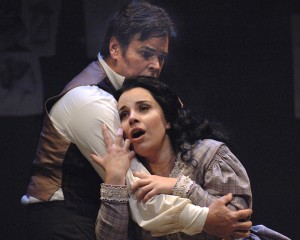
Strong New Music Offerings Set Festival Miami Apart
Sandra Lopez, with Marcus Haddock, as Mimi in La Boheme. Festival Miami gets going Friday, and this year’s selection of classical, jazz, pop and dance events opens with one of the most cherished compositions of Richard Strauss, the Four Last Songs.
Strauss wrote them in mid-1948, the year he turned 84, and although the title of the work comes from an editor and not the composer (who died a year later), they have always been seen as specifically valedictory works. Soprano Sandra Lopez will be the soloist with the Frost Symphony on Friday evening in these beautiful pieces, which sum up what one part of Strauss’ art was all about: long, sensual melody; rich, vivid orchestration; a refined sense of how to set words and make them sing.
That first concert also includes the Gloria of Francis Poulenc, the great French composer whose devotion to Catholicism was so much at odds with the artistic crowd of provocateurs with whom he associated, creators who were celebrated then as now for their impish disregard for the verities of the past. But Poulenc’s art, in the Gloria (written in 1959) as well as works such as his Quatre Motets Pour un Temps de Pénitence or the exquisite song Priez pour paix, is always deeply honest.
You can feel the intensity of his conviction in this music, and somehow its patchwork idiom, with its borrowings from popular styles, makes it even more heartfelt. It’s the work of an artist giving what he has, offering what’s at hand, to the object of his affection. Lopez will sing the soprano solo parts in the Poulenc (such as the radiant Domine Deus), and the Frost Chorale (led by Joshua Habermann, who also directs the Master Chorale of South Florida) the choral parts; all of it is accompanied by the Frost Symphony under Thomas Sleeper.
The rest of the festival has other good classical offerings, including one of my favorites, the faculty composition night (and the later student composition concert, too). This concert, set for Oct. 12, is exciting because the listener has no idea what’s coming next, and if he or she enters into it in the right spirit, it’s a chance to eavesdrop on one part of the national compositional conversation. It’s the sense of discovery that appeals here, and the concert for student works on Oct. 20 is even more attractive in this regard.
Many of the great composers we cherish now had their early work featured on programs such as these, and I’ve always wondered what it was like to have been in the audience when the young Prokofiev played his First Piano Concerto in St. Petersburg in 1911, or when a Preludo sinfonico by the promising young composer Giacomo Puccini got its first hearing in 1882 at a student concert in Milan. Did everyone know they were in the presence of writers who would later make such a huge impact on the music of their time?
Another major new-music event is set for Oct. 24, when the eminent jazz trumpeter and composer Arturo Sandoval gives the world premiere of Carlos Rafael Rivera’s Concierto de Miami at the Arsht Center. Sandoval will appear with the Miami Symphony under its music director, Eduardo Marturet, in the work by Rivera, who teaches at the University of Southern California’s Thornton School of Music.
And for those of us who love wind band music, there is the Frost Wind Ensemble concert on Oct. 19, which features soprano Amy Burton. She’ll solo in an arrangement of John Corigliano’s Mr. Tambourine Man, a song cycle set to lyrics by Bob Dylan. There’s a world premiere on this concert, too: Tropical Mainframes, a work by Mason Bates that also will be played at a national conference for college wind ensemble directors.
All in all, a good representation of new and older music, which will be buttressed by pianist Santiago Rodriguez on Oct. 15, the Bergonzi String Quartet on Oct. 17, and the Frost Chamber Players on Oct. 26. It’s a fine lineup, and that there is so much new music makes it more than just a demonstration of the breadth of UM’s music program. It also makes Festival Miami important.
Recent Content
-
Artsarticle ·
-
Artsarticle ·
-
Artsarticle ·
